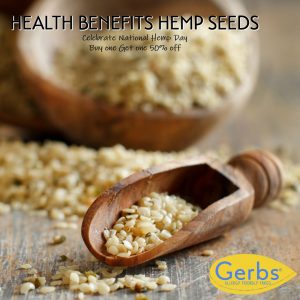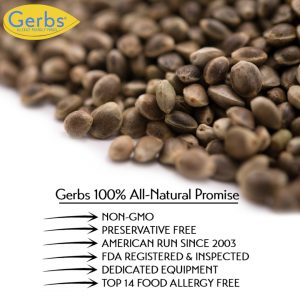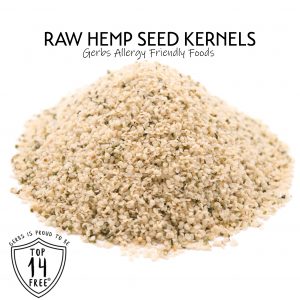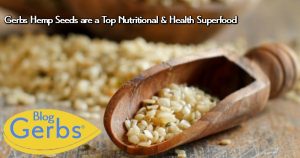Nutritional Benefits of Hemp Seeds
Nutritional benefits of hemp seeds
Many people consider hemp seeds to be a superfood. The seeds have a rich nutritional profile and provide a range of health benefits. Although hemp seeds come from the Cannabis sativa plant, they do not have any THC tetrahydrocannabinol, the chemical responsible for marijuana’s psychological effects. These small, brown seeds are rich in protein, fiber, and healthful fatty acids, including omega-3s and omega-6s. They have antioxidant effects and may reduce symptoms of numerous ailments, improving the health of the heart, skin, and joints.
PROTEIN-PACKED
Gerbs Hemp Seed Kernels contain almost as much protein as Gerbs Pumpkin Seeds. In every 30 grams (g) of seeds, or about 3 tablespoons, there are 9.46 g of protein. These seeds are a complete source of protein, meaning that they provide all nine essential amino acids. Amino acids are the building blocks for all proteins. The body cannot produce nine of these acids, so a person must absorb them through the diet. Relatively few plant-based foods are complete sources of protein, making hemp seeds a valuable addition to a vegetarian or vegan diet. Hemp seeds are especially rich in an amino acid called arginine, which has benefits for heart health.
UNSATURATED FATS
The health benefits of polyunsaturated fats, especially omega-3 fatty acids, are becoming increasingly well known. Gerbs Hemp Seeds are a great source of essential fatty acids, such as alpha-linolenic acid (ALA), which is an omega-3. The body cannot produce essential fatty acids, and the body must absorb them from the diet. They are crucial for long-term health.
The ratio of omega-3s to omega-6s is also important: In general, people tend to eat too many omega-6s and too few omega-3s, but adding Gerbs hemp seeds to the diet may help to promote a balance. According to results of a 2015 animal study, incorporating hemp seeds and hemp seed oil to hens’ diet led to eggs with increased levels of omega-3s in the yolks and a more healthful omega-3 to omega-6 ratio. Also, hemp seeds are low in saturated fats and contain no trans fats.
FIBER
Much of the fiber in a hemp seed lies in its outer hull, or shell. Gerbs offers Whole Hemp Seeds Unsalted hemp with the hulls intact. However, even without the shells, hemp seeds are a good source pf fiber, with three tablespoons containing approximately 1.2 g of fiber.
Consuming enough fiber every day can:
- reduce the appetite
- help with weight management
- work to stabilize blood sugar levels
- promote the health of the gut
VITAMINS & MINERALS
Gerbs Hemp seeds contain an impressive array of vitamins and minerals and are especially rich in:
- vitamin E
- magnesium
- phosphorous
- potassium
They are also a good source of iron, zinc, and B vitamins, including:
- niacin
- riboflavin
- thiamine
- vitamin B-6
- folate
HEALTH BENEFITS >>PROTECT THE BRAIN
A study published in the journal Food Chemistry found that hemp seed extract has antioxidant effects in lab tests. These effects may result from the seeds’ cannabidiol (CBD) content. Results of a review from 2018 suggest that CBD and other compounds in the seeds may have neuroprotective, anti-inflammatory, effects and may also help to regulate the immune system.
The review suggests that, because of these potential properties, CBD may help with neurological conditions, including:
- Parkinson’s disease
- Alzheimer’s disease
- multiple sclerosis
- neuropathic pain
- childhood seizure disorders
BOOST HEART HEALTH
The medical community believes that omega-3 fatty acids improve the health of the heart and reduce the risk of issues such as arrhythmias and heart disease. Gerbs Hemp Seeds contain high levels of omega-3s and a healthful ratio of omega-3 to omega-6 fatty acids. The seeds also contain high levels of arginine, an amino acid that turns into nitric oxide. Nitric oxide is essential for artery and vein dilation, and it helps keep blood vessel walls smooth and elastic. Lowering blood pressure, eating a healthful diet, and participating in varied forms of exercise may help to decrease the risk of heart failure.
REDUCE INFLAMMATION
The amount of omega-3s in hemp seeds and the seeds’ healthful omega-3 to omega-6 ratio can together help to reduce inflammation. In addition, hemp seeds are a rich source of gamma-linolenic acid (GLA), a polyunsaturated fatty acid that may also have anti-inflammatory effects. Some studies on animals suggest that GLA can act as a potent anti-inflammatory. However, recent studies in humans suggest that the acid is not always effective.
A review in The European Journal of Pharmacology states that humans process GLA in a very complicated way, which may explain why the studies in humans produce more varied results than those on animals. When looking at these studies, it is important to note that researchers usually use high concentrations of hemp seed extracts and that eating the seeds may produce less dramatic effects.
Reducing inflammation may help manage the symptoms of chronic diseases, such as:
- metabolic syndrome
- type 2 diabetes
- arthritis
- heart disease
- non-alcohol-related fatty liver disease
IMPROVE SKIN CONDITIONS
Atopic dermatitis (AD) and acne can both result from chronic inflammation. The anti-inflammatory compounds in hemp seeds may help. Among other possible dietary causes, acne may be linked to a deficiency in omega-3s. The high omega-3 content in hemp seeds may help to manage and reduce acne symptoms. A 2018 review explored the effects of dietary changes on skin diseases. While the authors found evidence that eating more omega-3s may improve symptoms of acne, determining the extent of the effects will require more research. The authors also note that prebiotics and plant fibers may help to manage symptoms of AD. Hemp seeds are a rich source of plant fiber.
RELIEVE RHEUMATOID ARTHRITIS
Rheumatoid arthritis is an autoimmune condition. It causes the immune system to attack its own tissues, which leads to inflammation in the joints. In 2014, research conducted in human cells suggested that hemp seed oil could have anti-rheumatic effects. However, a 2018 review found a lack of conclusive evidence to suggest that cannabinoids could effectively treat rheumatic diseases. The authors noted that more research is needed.
Original Post (https://www.medicalnewstoday.com/articles/323037.php)



Leave a Reply